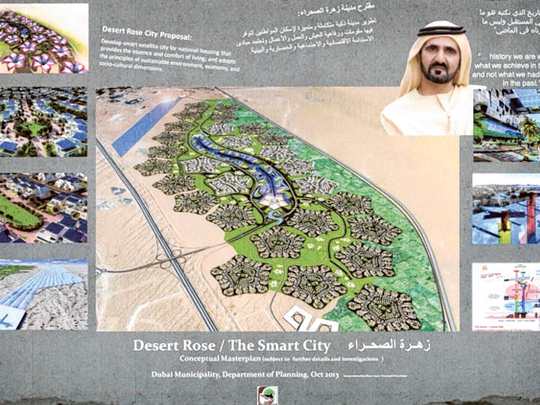
Dubai: The emirate’s plans for a sustainable city are taking shape as officials on Monday confirmed that the residential project will be known as Desert Rose.
The project – which is expected to accommodate 20,000 plots for Emiratis – is located between Al Ruwaya and Al Aweer and will cover a total area of 14,000 hectares. The city will be built in the shape of a desert flower.
“We do not have a time frame yet but the design and concept of the project is currently under study. It is a huge project that will be carried out in several stages, and we expect some of it to be completed in time for Expo 2020,” Dawood Al Hajiri, director of the Planning Department at Dubai Municipality, told Gulf News yesterday.
The project is aimed at enhancing Dubai’s ambition to become one of the top 10 sustainable cities by 2020, and will be built at a cost of Dh20 billion.
“Desert Rose is an Emirati housing project that will have recreational and sustainable features, where the roofs of homes and buildings will be covered with solar panels that will provide 200 megawatts of electricity. The city will also recycle over 40,000 cubic metres of waste water,” said Al Hajiri.
He explained that some of the main features of the sustainable city will also include an electronic train track connected with Dubai Metro.
“The pedestrian path will be designed in an eco-friendly way that will be air-conditioned only during the hot season, and will have a green belt equipped with environmental and economical benefits that will be used for agricultural purposes,” he said.
The project, located near Emirates Road towards the desert, will take the shape of a desert flower in different colours which is in line with the desert environment and as a representation of local sustainability.
“The project will incorporate the entire requirements of citizens under one roof of the proposed city,” said Hussain Nasser Lootah, Director-General of Dubai Municipality.
“The city will take into account the geographical nature of the location and will include the reduction of dependence on private transportation, providing housing along the Metro line and stations, waste recycling, and the reduction of carbon footprint,” he said.











